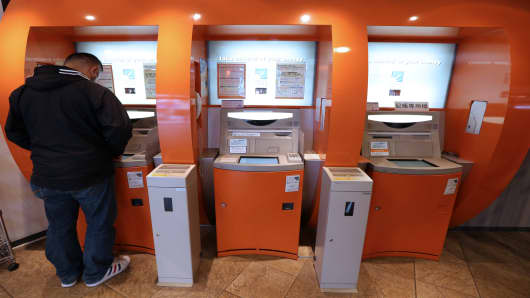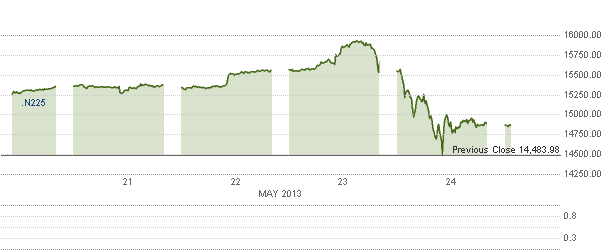The volatility in the Japanese government debt market has unnerved investors in domestic banks, with some of the country's biggest lenders alone holding an estimated 40 trillion yen ($390 billion) worth of these bonds.
A spike on Thursday in the benchmark 10-year Japanese government bond (JGB) yield to 1 percent - its highest level in a more than a year - fanned worries about the potential for massive paper losses for banks and led to heavy selling in banking stocks listed on the Nikkei.
Mitsubishi UFJ Financial, Japan's largest lender by assets, has about 48.7 trillion yen worth of JGBs, according to the bank's latest financial statement.
While at still relatively low levels, yields have jumped more than 55 basis points from a record low of 0.315 percent hit just after the Bank of Japan (BOJ) unveiled its radical monetary stimulus on April 4, undermined by uncertainty over what the BOJ's new policies mean for the debt market.
(Read More: Mammoth Japan Stimulus Still Not Enough: Hayman's Bass)
"Banks are the ones that could suffer the most from balance sheet problems because of JGB volatility," said Ben Collett, the head of Asian equities at Sunrise Brokers in Hong Kong.
"The banks will have a problem should JGBs come off and that is the trend that could continue. But bank business is not just about JGB holdings so that's an important point," he said, adding that he was looking to buy shares in "high quality" Japanese banks following Thursday's stock market sell-off.
The Nikkei dropped over 7 percent in what was its biggest one-day drop in over two years, while Japan's three biggest banks Mizuho Financial Group, Mitsubishi UFJ Financial and Sumitomo Mitsui Financial Group slumped between 7 percent and 11 percent on Thursday.
Despite the sell-off, Japanese banks have strong financials . According to ratings agency Standard & Poor's, Japan's five major banking groups achieved their strongest financial results in the fiscal year that ended in March, since 2006 on the back of positive tax effects, overseas business and increased fee income.
"We take the view that the [banking] groups' stable profits and relatively low asset risk by international standards support each group's credit quality," S&P said in a report earlier this week.
The Nikkei gave up early gains on Friday to trade more than 1.5 percent lower. Banking stocks edged down in line with the broad-market weakness to trade 0.5- 1 percent lower.
In the bond market, yields pulled back from Thursday's peaks with the 10-year JGB yield to around 0.84 percent.
(Read More: Japan Market Bulls Unwavered by Stocks Rout)




